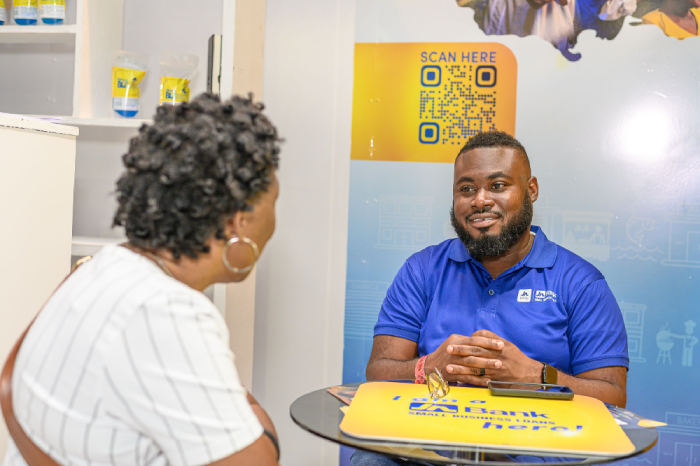This website uses cookies so that we can provide you with the best user experience possible. Cookie information is stored in your browser and performs functions such as recognising you when you return to our website and helping our team to understand which sections of the website you find most interesting and useful.

Safeguarding the finances of a loved one with Dementia
When Simone Thompson* began noticing that her 60-year-old mother was forgetting where she had just placed something and being disoriented when she goes to familiar places, as well as becoming irritable and frustrated easily, it raised a red flag.
While her mother’s condition has not been officially diagnosed, Mrs Thompson pointed out that her mother’s behaviour mirrors that of her mother’s older sister who was diagnosed with Alzheimer disease 10 years ago, and who now requires round-the-clock supervision.
“No matter how many times you tell her something, she will forget. She will also tell you something that she already told you, and she has difficulty completing a basic form,” Mrs. Thompson explained.
“At first I was in a state of denial. Mentally, I wasn’t accepting it,” she further disclosed.
Being aware that persons with memory loss can become the victims of scams and financial fraud, Mrs Thompson is taking steps to become more integral in the management of her mother’s financial affairs. This includes plans to sign up for online banking so that she can track her mother’s transactions, taking charge of her mother’s ATM card, and having her name added to a savings account, which her mother holds jointly with a relative who lives overseas.
Claudine Allen, member ombudsman at The Jamaica National Group, commends Mrs Thompson for her proactive approach.
“When a loved one begins to lose his or her memory, it becomes increasingly difficult for him or her to make prudent financial decisions. Unfortunately, unscrupulous persons take advantage of such situations and that’s one of the reasons older persons tend to become victims of scams. They sometimes lose their life savings this way,” she said.
Ms Allen pointed out that when loved ones begin to show signs of being unable to do certain banking activities that they previously managed with ease, intervention is immediately required. Among the signs for concern she outlined are:
- Problems counting money and misunderstanding the value of money
- Not having any recollection of purchases or payments made
- Forgetting due dates and payment amounts
- Unable to find where they put their money and financial documents
- Difficulty in understanding a bill or a financial statement
- Inability to remember their PIN for their ATM card or username and password for online banking
- Making multiple withdrawals within a short time
- Not making an effort to collect outstanding money owed to them
- Not honouring financial obligations
She urges persons who have loved ones who are beginning to suffer from dementia to have a conversation with them about the future management of their finances. Importantly, the conversation should include making a will, if one has not been done already.
“Many times people associate making a will with death. It is always advisable to make a will regardless of your age so that your wishes concerning your estate can be upheld. Furthermore, making a will helps to safeguard one’s assets,” she adds.
“If at all possible, identify a responsible, trust-worthy individual to make all important payments such as mortgages, utilities and so on,” she went on. “Low value transactions can be left to the elder to preserve their sense of usefulness.”
Ms. Allen provides the following tips for caregivers of persons with dementia to safeguard their finances:
- When the time is right, take a check of all bank accounts. Confirm the balance and persons who have access. Look out for fixed deposits and long term investment accounts
- Ensure your parents are comfortable with all arrangements and get to know their banker
- Establish a standing order arrangement with your loved one’s financial institution to take care of monthly obligations such as mortgage payments
- Keep track of banking transactions by using an online banking portal or by visiting the financial institution
- Arrange for pension payments and other income to be received in a bank account which is easily accessible
- Keep all their financial documents such as insurance policies and credit card statements in one, safe place. Make sure it is waterproof
- Monitor debit and credit card usage. You may also consider reducing the credit card limit to reduce exposure in the event something goes wrong
- Maintain their independence by allowing them to have some money to keep, even a small amount
- As far as possible, involve them in the decision making when it comes to expenditures
“As our loved ones age, it becomes more important to pay attention to preserving quality of life. Ensure they receive the medical attention necessary to remain in good health. And, take steps to keep your banking and financial affairs in good health too,” Ms Allen emphasised.
According to the World Health Organisation, Alzheimer’s disease is the most common form of dementia and may contribute to 60–70% of cases. Worldwide, around 50 million people have dementia, with nearly 10 million new cases every year. Although dementia mainly affects older people, it is not a normal part of ageing.
*Not her real name
Check out more stories like this

‘We Are Taking the Wrong Approach to Owning Real Estate’
Expert Realtor Shares Crucial Advice for First-time Buyers Considering continued...

Knowledge, Adaptability Important in Era of AI – Tech Experts
In an era of rapidly advancing Artificial Intelligence (AI), organizations...

See you at Expo Jamaica 2025 this Week!
Come to Expo Jamaica 2025 this weekend and be sure...
